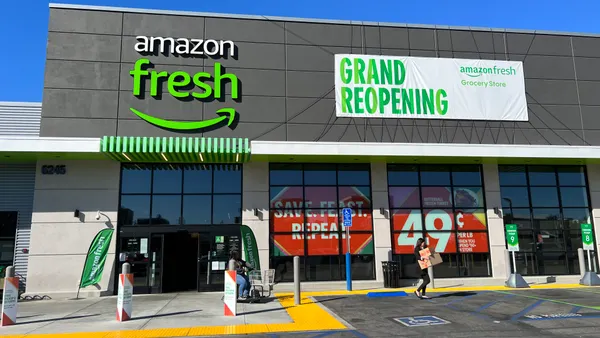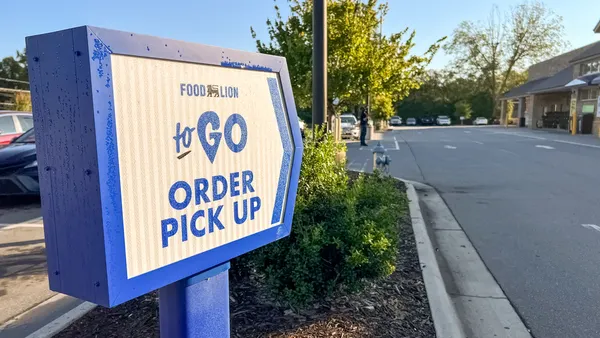Dive Brief:
- Target leap-frogged three competitors to become the 8th largest e-commerce player in the U.S, according to eMarketer's latest market share rankings. The ranks mark Target's entry onto the top 10 list.
- Target's e-commerce business will expand by 24% to $8.3 billion this year, eMarketer estimates, giving it 1.2% market share in 2020, according to an emailed press release. To make it to the No. 8 spot, Target edged past Qurate Retail Group, Costco and Macy's.
- Once again the top e-commerce player, by leaps and bounds, is Amazon with projected market share of nearly 39% for 2020. Next in line is Walmart, with 5.3% market share, followed by eBay (4.7%), Apple (3.7%), Home Depot (1.7%), Wayfair (1.5%) and Best Buy (1.3%). Costco (1.2% share) and Macy's (1.1%) took the No. 9 and No. 10 spots respectively.
Dive Insight:
In the release, eMarkerter noted that Target's investments in its digital operations have been "paying off," with Target's estimated digital sales in 2020 projected to more than double those in 2017.
"At a time when brick-and-mortar stores are struggling to keep up with the fast-changing retail landscape, Target seems to have hit the bullseye," eMarketer forecasting analyst Cindy Liu said in the release. "Store renovations and expanding same-day fulfillment options, such as in-store pickup, drive-up and delivery with Shipt, are paying off. Target has found a way to use its stores to fulfill online orders while keeping up with customer demands for convenience and speed."

Another sign that Target has been improving its digital game were its toy sales in 2019. While its sales in the category were flat overall, which came as a disappointment to executives and analysts, Target's online toy sales grew around 12% year over year in the fourth quarter, according to 1010data. The data and analytics firm even found that Target took some share from Amazon in online toy sales.
Target's Shipt acquisition has given the retailer more delivery options, while the retailer has also expanded its pick-up and drive-up capabilities. That gives Target more options to offer customers, while store fulfillment has helped make online orders more efficient and profitable.
Walmart also moved up a slot from 2019, surpassing eBay to become the No. 2 e-commerce player in 2020, after deep investments into its digital business (not all of which have panned out). But the elephant in the room, as it has been for years, is Amazon.
Like Walmart and Target, and then some, Amazon has poured money into its same-day shipping, which for Amazon paid off in Q4 and 2019 sales growth. According to eMarketer, Amazon is poised to add an extra 1.4% to its market share and command 4.6% of all retail sales in the U.S., online and off.














